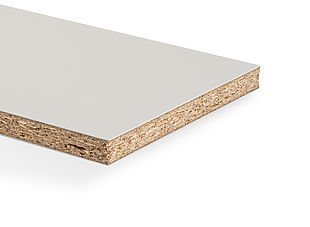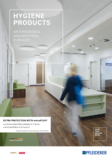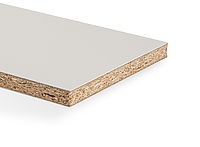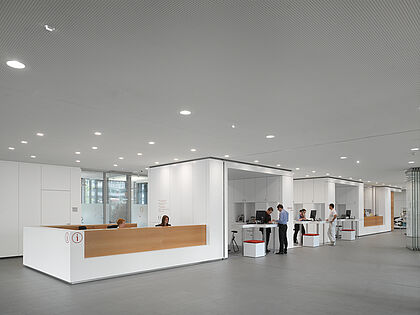Areas of application
The special material composition opens up new possibilities for discerning furniture and interior design concepts. In the private sector, but also in restaurants, in cultural and conference centres, banks, offices and in shop design. For installations, design and presentation elements, shelving, furniture fronts, racking, desks, tabletops and worktops, etc. However, the material is not suitable for areas that are subject to major climatic fluctuations in terms of temperature and humidity or that are subject to permanent exposure to moisture.
Certificates & labels
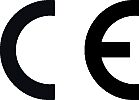
CE conformity
The CE-marking documents that goods comply with the safety and health requirements of the European Union. Its aim is to guarantee safe, flawless and high-quality goods on all European markets.
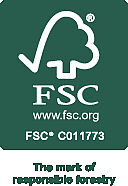
FSC-certified
The Forest Stewardship Council (FSC) is a global, not-for-profit organization dedicated to the promotion of responsible forest management worlwide. FSC defines standards based on agreed principles for responsible forest stewardship that are supported by environmental, social and economic stakeholders.
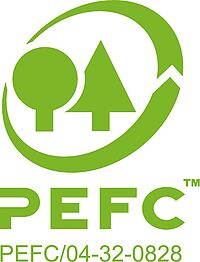
PEFC certified
PEFC is the largest institution for ensuring sustainable forest management through an independent certification system. Wood and wood products with the PEFC seal originate demonstrably from ecologically, economically and socially sustainable forestry.

UKCA conformity
The UKCA-marking documents that goods comply with the safety and health requirements of the United Kingdom. Its aim is to guarantee safe, flawless and high-quality goods on all United Kingdom markets.
Product section

Availability
Formats
| Length (mm) | Width (mm) | Thickness (mm), HPL 0.8 mm | Thickness (mm), HPL 1.2 mm |
|---|---|---|---|
| 2,800 | 2,070 | 9.6 | 16 | 17.6 | 19 | 20.6 | 23.6 | 25 | 29.6 | 39.6 | 10.4 | 16.8 | 18.4 | 19.8 | 21.4 | 24.4 | 25.8 | 30.4 | 40.4 |
| 4,100 | 1,300 | 9.6 | 16 | 17.6 | 19 | 20.6 | 25 | 29.6 | 39.6 | 10.4 | 16.8 | 18.4 | 19.8 | 21.4 | 25.8 | 30.4 | 40.4 |
Product features
Product standard
- EN 13894-1
Core material
- ClassicBoard P2 CARB2: Low emission particleboard core, type P2 in accordance with EN 312, suitable for non load-bearing purposes in dry areas.
- ClassicBoard P2: Urea resin-bonded particleboard, type P2 in accordance with EN 312, suitable for non load-bearing purposes in dry areas.
Reaction to fire
- Normally flammable
- D-s2,d0 (EN 13501-1, CWFT acc. to 2003/593/EG)
EC scope
- EN 438-7:2005
- HPL composite panel intended for internal wall and ceiling finishes (including suspended ceilings)
Formaldehyde emission class
- E1 E05
Antimicrobial effect
- Surface with antimicrobial effect in 24 h for interior fit-out and finishes – Test Methodology JIS Z 2801 / ISO 22196
Product safety
- This product follows the REACH regulation EC 1907/2006 an article. Following Article 7 it does not need to be registered.
- The surface is physiologically safe, and approved for direct contact with food acc. to Regulation (EU) No. 10/2011.
- We manufacture the panels without the use of halogens, heavy metals, preservatives, wood protectors or organic solvents.
Special
- FSC certification or PEFC certification available on request.
Colour and surface match
- Decor, structure and core board all influence the final appearance of the end product.
- Due to the product-specific differences in production technologies, even identical decor/structure/core board combinations can result in slight optical and tactile deviations across different product groups and formats. Such deviations do not constitute a defect.
- The choice of surface structure in particular has a significant influence on the visual impression, the tactile perception as well as the technical characteristics of the product. Thus, the overall impression of a decor can change almost completely depending on the surface structure. Furthermore, mechanical influences on the product surface can lead to a higher contrast optical perception with dark decors.
- To ensure that you always achieve the best results with our products and to clarify any deviations in advance, we will be happy to advise you individually.
Product handling
Processing
- All recommendations that apply to working normal Duropal HPL products should also be noted and followed for Duropal SolidColor.
- Internal recesses and cutouts: Pfleiderer does not accept any liability in case of damage, for example, cracks that occur in Duropal SolidColor boards due to internal recesses. If internal recesses are nonetheless required in special cases due the type of working, the following instructions must be followed carefully to minimise the risk of cracking.
- Burrs can be removed in the usual way using carbide tipper taper or square cutters.
- Larger chamfers (45°) can be created at the crown Point.
- It must be noted that wide chamfers, for visual reasons alone, require time-consuming fine machining work. The miller/cutter motors must be dimensioned accordingly. Cutting tools with hard metal/carbide tips and high true-running are required to prevent chatter marks. The feed rate must be reduced in corners and cutting point areas, as otherwise these could break out.
- After milling, regrind or polish with grit 200-400 to optimise the surface uniformity.
- As far as we are aware, intensive polishing of the cut edge surface is possible using carnauba-based waxes.
Machines and tools
- Although Duropal SolidColor is somewhat harder and more brittle than conventional Duropal HPL products, there is hardly any increased tool wear during cutting or sawing.
- Hard metal-tipped (preferably diamond-tipped) tools must be sharp, as this is the only way to achieve the best results.
Edging
- It is possible to approach Duropal SolidColor edges with an edge banding machine using hot-melt adhesives, but this requires extra care. Here too, sharp carbide tools must be mounted on all milling and trimming equipment to achieve perfect results in the corner areas even with all-round edging (door fronts, etc.).
- To improve adhesion, pre-heat the edges before bonding (edge banding machine with hot air support). Pre-heating ensures that the end temperature is reached in the actual approach phase, which is required to melt the hot-melt adhesive to form a liquid state. This also ensures a thinner and thus less visible glue joint.
- The application temperature should be at least 200° C.
- In order to achieve good results, it is necessary to select the right adhesive and take great care during machining (if the edge is applied beforehand). Hot-melt adhesives and pigmented neoprene may not achieve the required result.
Fitting technology
- All conventional removable and non-removable fittings for solid wood and wood materials are suitable.
Installation and assembly
- Sufficient conditioning is required prior to installation. The premises themselves need to be air-conditioned according to the future use.
- Where panels are covered with protective films, these must be removed from both sides of the panel at the same time to avoid warping. Remove the protective film before using the product, six months after delivery at the latest.
- Especially for large applications, we recommend paying attention to the colour and texture uniformity of the boards and cut products used when further processing and installing and that the production direction is taken into account.
- The material is not suitable for areas subject to large fluctuations in temperature and humidity.
- Avoid direct exposure to heat and any possible dehydration of the surfaces by light- or heat radiation or by air currents from heating- or air conditioning systems.
- Please ensure that the material is processed and fitted correctly and using the best available technology.
Storage, handling and transport
- Please note that due to their material composition, through-dyed laminates are somewhat harder and more brittle than classic laminates with dark phenol resin core and are subject to marked warp in the event of climate fluctuations.
- The material must be stored flat, level and horizontal on clean surfaces at normal climatic conditions (Temperature 18–25 °C, relative humidity 50–65 %).
- Avoid storage in the direct vicinity of thoroughfare gates, e.g. in the area of loading and unloading zones.
- Protect from moisture and wet conditions.
- Avoid direct exposure to heat and any possible dehydration of the surfaces by light- or heat radiation or by air currents from heating- or air conditioning systems.
- Avoid exposure to direct sunshine or UV rays, especially of products covered in film.
- Vertical storage is not recommended.
- Please note that incorrect storage, regardless of its duration, may cause irreversible distortion to the sheets.
- Foreign bodies or impurities in the pallet of sheets can lead to impressions and damage to the surface of the board.
- Sheets / boards must not be moved against each other; they should be moved individually by hand or with suction equipment.
- Ensure that sufficiently large and sturdy bases, e.g. pallets, are used for the transportation of stacked sheets. The sheets on the pallet must be secured against slipping.
Health and safety
- Please wear the appropriate personal protective equipment (PPE) when processing and handling.
Cleaning and care
- The surface can be cleaned with water and non-aggressive cleaning products. For more detailed information, please refer to our "Cleaning recommendation Decorative Pfleiderer products".
- For further information, please follow the recommendation in the "Cleaning HPL" leaflet on the site www.icdli.com.
Disposal
- Energy recovery in industrial furnaces at temperatures above 700 °C.
Technical downloads
You like to learn more?
Please get in touch with us! We look forward to hearing from you.
